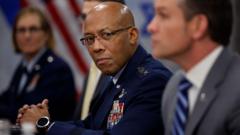On Friday, President Donald Trump announced the termination of CQ Brown, the first black officer to serve as Chairman of the Joint Chiefs of Staff, alongside five other senior military leaders, as part of a sweeping overhaul of the Pentagon's leadership. The President expressed gratitude for Brown’s service, who had taken on the dual role of advising the administration on national security matters.
Defense Secretary Pete Hegseth had previously criticized General Brown for his commitment to diversity, equity, and inclusion efforts, labeling the focus as excessive. Following Brown's removal, two more top officers—Chief of Naval Operations Admiral Lisa Franchetti and Vice Chief of Staff of the Air Force General Jim Slife—were also announced to be stepping down. Notably, Admiral Franchetti was the first woman to helm the U.S. Navy.
All three officers had been appointed by President Biden, prompting Hegseth to declare the need for new leadership focused on “deterring, fighting, and winning” wars, as he stated in a formal communication. To assume Brown's former role, Trump plans to nominate Air Force Lieutenant General Dan Caine, a seasoned pilot with extensive military and CIA experience.
General Brown's dismissal comes just hours after he engaged with troops at the southern border, amidst growing speculation surrounding Trump's intentions. Brown had previously made headlines for addressing racial issues, notably in the wake of George Floyd’s death, and he had actively advocated for diversity in military recruitment.
Trump's administration has displayed a pattern of removing leaders perceived to overly focus on diversity initiatives; his first month in office included the dismissal of the Coast Guard's first female commandant. Additionally, as part of a broader budget reduction strategy, the Pentagon revealed plans to cut 5,400 probationary positions.
In a noteworthy juxtaposition, a federal court in Maryland has temporarily blocked Trump’s efforts to impose bans on diversity programs, citing potential violations of free speech rights protected by the U.S. Constitution—which may complicate his administration's personnel strategy moving forward.
Defense Secretary Pete Hegseth had previously criticized General Brown for his commitment to diversity, equity, and inclusion efforts, labeling the focus as excessive. Following Brown's removal, two more top officers—Chief of Naval Operations Admiral Lisa Franchetti and Vice Chief of Staff of the Air Force General Jim Slife—were also announced to be stepping down. Notably, Admiral Franchetti was the first woman to helm the U.S. Navy.
All three officers had been appointed by President Biden, prompting Hegseth to declare the need for new leadership focused on “deterring, fighting, and winning” wars, as he stated in a formal communication. To assume Brown's former role, Trump plans to nominate Air Force Lieutenant General Dan Caine, a seasoned pilot with extensive military and CIA experience.
General Brown's dismissal comes just hours after he engaged with troops at the southern border, amidst growing speculation surrounding Trump's intentions. Brown had previously made headlines for addressing racial issues, notably in the wake of George Floyd’s death, and he had actively advocated for diversity in military recruitment.
Trump's administration has displayed a pattern of removing leaders perceived to overly focus on diversity initiatives; his first month in office included the dismissal of the Coast Guard's first female commandant. Additionally, as part of a broader budget reduction strategy, the Pentagon revealed plans to cut 5,400 probationary positions.
In a noteworthy juxtaposition, a federal court in Maryland has temporarily blocked Trump’s efforts to impose bans on diversity programs, citing potential violations of free speech rights protected by the U.S. Constitution—which may complicate his administration's personnel strategy moving forward.




















